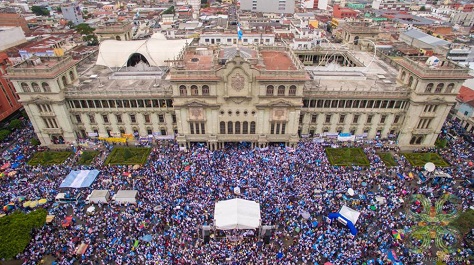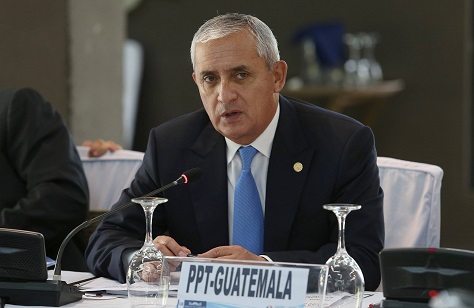 Photo credit to Quetzalvision.
Photo credit to Quetzalvision.
Six days before Guatemalans go to the polls to choose a successor to president Otto Pérez Molina, the country’s congress voted to strip the term-limited incumbent of his immunity, opening the way for what might become the first prosecution of a Guatemalan president on corruption charges in Guatemala.
The vote today in Guatemala’s Congress was historic, and it will make Sunday’s unpredictable general election even more difficult to forecast. But it wasn’t exactly a bombshell, even though it seems like a key turning point in the gradual maturation of Central American democracy and law.
When Pérez Molina, a retired army general, took office, he quickly found himself on Washington’s bad side when he argued for drug legalization as a solution to the decades-long failures of the US-led war on drugs. At home, however, he was regarded as a tough-on-crime conservative whose military background might help police efforts to reduce drug- and gang-related violence, despite murmurs about his role in various human rights abuses during Guatemala’s sprawling decades-long civil war that reached a gruesome nadir in the early 1980s.

During his presidency, however, Guatemalans became increasingly angry over the corruption that, at best, took place on Pérez Molina’s watch and that, at worst, directly implicates Pérez Molina (pictured above). So far, 14 ministers have resigned as a result of a wide-ranging customs fraud scheme, referred to as La Línea, including seven ministers in August alone and finance minister Dorval Carías last week. Roxana Baldetti, Guatemala’s first female vice president, resigned in May and is now in prison pending trial on corruption charges. Pérez Molina continues to deny any wrongdoing on his part, and he defiantly refused to resign just last week in a press conference, buttressed perhaps with the support of Guatemala’s wealthiest businessman, telecom magnate Mario López Estrada.
Since a United Nations report first revealed the customs scandal in April, however, many Guatemalans have grown skeptical of Pérez Molina’s claims of innocence and, though he survived a congressional vote to remove his immunity last month, prosecutors later announced that they believed Pérez Molina is implicated in the customs scandal. Today’s congressional decision will allow prosecutors to move forward with tax evasion, money laundering or other corruption charges, and it makes it much less likely that Pérez Molina will survive in office until January, when Guatemala’s next president will assume power. Notably, even members of the conservative Partido Patriota (PP, Patriot Party) that Pérez Molina founded in 2001 supported the decision to lift his immunity, the recommendation of a congressional committee examining the scandal.
Corruption is rampant in the region, but voters are increasingly engaged and have started pushing back against the perception of widespread graft. Protesters in Honduras this summer are demanding accountability from officials, and in last year’s Costa Rican election, outgoing president Laura Chinchilla’s administration was seen as so scandal–plagued that her party’s candidate, San Jose mayor Johnny Araya, withdrew from a runoff rather than face a shellacking from his rival, the soft-spoken diplomat and political neophyte Luis Guillermo Solís.
So where does that leave the Guatemalan presidential election? Continue reading Guatemala lifts Pérez Molina’s immunity six days before vote to replace him →

![]()

